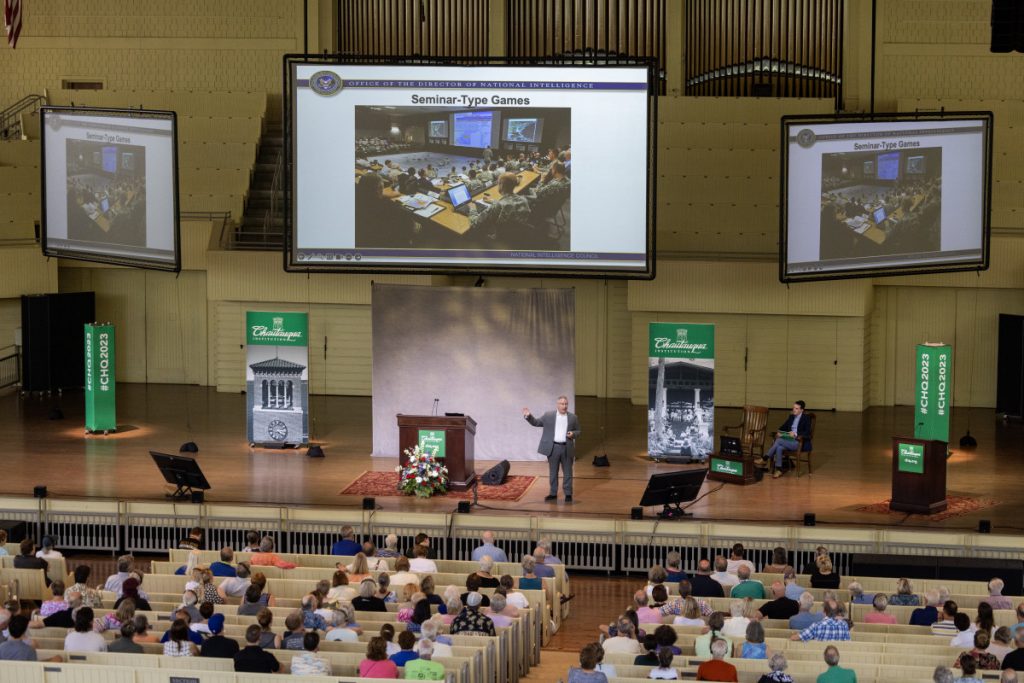
Alton Northup
Staff Writer
Being an intelligence analyst, said Joseph C. Cyrulik, is as simple as doing a 2,000-piece jigsaw puzzle. Except, the box it came in has no picture; only 400 pieces are yours; each night someone adds 100 more pieces to your pile; and there is a deadline nobody told you about.
And if you mess up, bad things can happen: “In this case, the downfall of Western civilization,” Cyrulik said.
Games are crucial to his work as deputy director of the Strategic Futures Group, an office of the National Intelligence Council. He shared the history of games in intelligence – and his personal experience with them – in his lecture, “Serious Games for Solving Serious Problems,” at 10:45 a.m. Thursday in the Amphitheater to continue the Chautauqua Lecture Series Week Two theme, “Games: A Celebration of Our Most Human Pastime.”
As a child, Cyrulik had taken a liking to tabletop war games. His first game was the 1961 Civil War strategy game, Chancellorsville. When he finally had enough money to buy a game on his own, he chose The Third World War: Battle for Germany — a simulation of a war that never was between forces of NATO and the Warsaw Pact.

In college, he upgraded his board games and joined his school’s Model European Union team. There, he met a professor who was using his childhood board games as tools in a course titled “Statecraft, War and Diplomacy.”
When he joined the intelligence community after graduation, he also added games to his repertoire.
“I started using games as an analyst not because I like games – though I do – and not because they’re entertaining – though they are – but for the most important reason, which is they gave me information that I couldn’t get anywhere else,” he said. “Despite all the tools of the intelligence community, there are some things that only a game could provide.”
Games have long been used to inform intelligence, Cyrulik explained: In the 19th century, the Prussian General Staff developed Kriegsspiel, the first gaming system for use as a serious military tool.
The game was rooted in Prussian field marshal Helmuth von Moltke’s philosophy that “no plan survives first contact with the enemy” and consisted of two teams simulating a war with wooden blocks and a paper map. Players commanded their troops by writing their orders on paper and handing them to an umpire, who would execute their orders and determine the outcome through mathematical calculations.
As Prussia celebrated a surprising victory in the Franco-Prussian War, other countries started to consider the benefit of war games.
In the following decades, games would become an important factor of warfare. In the 1930s, the United States developed a series of Rainbow Plans, named for their color-coded system, that outlined strategies for a variety of hypothetical wars. Among them was a red plan for the United Kingdom, a black plan for Germany and an orange plan for Japan.
War Plan Orange was regularly reviewed and rehearsed at the Naval War College in the lead up to World War II.
“What actually occurred in the war against Japan in the Pacific was, in its broad outlines, pretty close to the depiction of War Plan Orange,” Cyrulik said.
Fleet Admiral Chester Nimitz agreed in a 1960 lecture, but said they had not foreseen the use of kamikaze tactics toward the end of the war. Cyrulik, not wanting to slight his predecessors, said that “if we used modern techniques and modern depictions of how we do war games today … we would’ve gotten close.”
The previous techniques for gathering and piecing together intelligence were overhauled after blue-ribbon committees investigating the Sept. 11 attacks and invasion of Iraq found shortcomings in the intelligence process.
“(After Sept. 11,) the biggest criticisms were failure of imagination, and the way that was described is ‘the dots were there; we failed to connect them,’ ” Cyrulik said. “After Iraq, … the failure was the exact opposite; there was perhaps too much imagination” when it came to non-existent weapons of mass destruction.
The CIA proposed developing new tools for analysts, including increasing the use and quality of games.
The primary games used by the federal government are serious games – such as war exercises at Fort Irwin to train soldiers – and analytic games that assess strategies, events and courses of action at an international level. Cyrulik works with analytic games.
“I don’t care who wins; I don’t care who loses,” he said. “What I care about is how we got there — what decisions you made along the way, and what happened from A to B — because that’s where the analysis takes place.”
The types of games intelligence officers use vary. There are stereotypical tabletop games with bright maps and moveable pieces, but also Red Team games where analysts react to U.S. actions from the enemy’s perspective. Most games, however, are seminar-style.
These games are designed to test future concepts and predict their outcomes. Sessions may have as many as 200 players and last for weeks.
“These are fundamentally human-centric games,” Cyrulik said. “Rather than the adjudication being the responsibility of a quantitative model, the adjudication in seminar games is really built around the qualitative interactions of teams of people.”
The human aspect of these games is invaluable, he said. By bringing together critical and creative minds, the intelligence community can avoid rigid thinking that focuses only on the most probable outcomes.
The incorporation of naturalized officers – intelligence officers who grew up in another country but have since become U.S. citizens – has also helped in understanding the emotions and thoughts that occur when defending one’s culture. For example, intelligence groups focusing on Russia have several officers of Russian origin, which helps close past simulations’ gaps, such as those found in War Plan Orange.
“We use the best aspects of human nature and we leverage them to get a goal we want,” Cyrulik said.
The most important application of games in intelligence, he said, is making the unknowable known. While a spy can provide satellite images of an airfield, or find the location of Osama bin Laden, it is a mystery how countries will react to an event that has not happened yet.
“Games do spectacularly well at figuring out answers, or at least informing answers, to where we have speculative questions with a profound lack of information available,” Cyrulik said.
Recently, President Joe Biden’s administration conducted a geo-engineering simulation. Geo-engineering is deliberate climate change, usually through the release of sulfur into the atmosphere. The goal of the simulation was to formulate an American response to a nation deploying this technology.
If such a situation eventually did happen, the U.S. response might differ from the plan, Cyrulik said. But at least the government won’t react blindly.
“Game after game, I can’t say that we have predicted the actual decisions of every adversary we played,” he said. “But we came to every decision point, and we’ve identified the key decision points. … At the end of the day, they might go left instead of going right, but we’ll know where that turn is, and we’ll know the outcomes if they go either way. That’s where the value of gaming comes in.”




